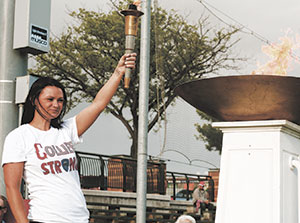Lawmakers seek benefits for Collier family
*

Sean Collier’s sister, Jenn Rogers, lit the ceremonial flame at this year’s Somerville Special Olympics event.
– Photo by Karalyn Connolly
By Elizabeth Sheeran
It won’t bring him back. But local lawmakers are pursuing all avenues to see that Officer Sean Collier’s family receives all possible state and federal survivors’ benefits.
Collier was on duty as an MIT campus police officer on April 18 when he was allegedly shot and killed by the Boston Marathon bombing suspects in an attempt to steal his gun. A Somerville resident, he had served three years as a volunteer with Somerville’s Auxiliary Police Department, and had been scheduled to join the Somerville police force full time in June. Governor Deval Patrick in May signed legislation that posthumously made Collier a Somerville police officer, giving his family a badge and badge number, which was immediately retired.
Now state legislators have sent the governor a budget bill that includes an appropriation to pay $100,000 in non-taxable state death benefits to Collier’s next-of-kin.
“Sean Collier was a true hero dedicated to protecting his community, who tragically lost his life in the line of duty. It is a loss for everyone: family, friends and the entire community at large,” said State Senator Patricia Jehlen of Somerville. “For this reason, the Collier family deserves whatever support the community and state is able to provide them.”
Massachusetts General Law 100A provides for the state retirement board to pay the one-time death benefit to the family of any public safety employee killed in the line of duty. The law defines “public safety employee” very broadly and includes campus police officers like Collier who have been sworn in as so-called “special state police officers” with the power to arrest.
But the benefit is subject to appropriation, and all of the money set aside last year had already been paid out, so the funds for Collier’s family had to go through the state budget process.
Beacon Hill last week passed a supplemental appropriations bill for the 2013 fiscal year, which included the killed-in-the-line-of-duty benefit “in recognition of heroic measures taken by officer Sean Allen Collier…to protect the public safety of the commonwealth.” That language was originally in 2014 state budget proposals, but lawmakers moved it to the 2013 appropriations bill during recent budget negotiations, after more revenue became available for the fiscal year ended June 30.
Governor Patrick was expected to sign the bill this week. But while it now appears only a matter of time before Officer Collier’s family gets the state benefits they deserve, the road to federal benefits is a little more uphill.
The U.S. Department of Justice provides funds to the families of public safety officers killed in the line of duty, under the Public Safety Officers’ Benefits program. Survivors of fallen law enforcement officers, firefighters and other first responders, such as emergency medical workers, can receive a standard death benefit of more than $300,000. But unlike in Massachusetts, campus police aren’t on the Justice Department’s list of eligible public safety officers unless they’re at state schools.
Somerville’s U.S. Representative Michael Capuano last month filed the Officer Sean Collier Campus Police Recognition Act, to add campus police officers at non-public institutions to the list of first responders who qualify for disability or death benefits under the Justice Department program. The bill would make the change retroactive to April 15, 2013, the day of the Marathon bombings, so that Collier’s family would be eligible to receive benefits.
“Officer Collier was a hero who lost his life while doing a job he loved, serving and protecting the MIT community as a member of campus law enforcement. This bill is a small way to honor his memory,” said Congressman Capuano of the bill, which was co-sponsored by the entire Massachusetts House Congressional delegation. The bill has been referred to the House Judiciary Committee, where it awaits further action.












Reader Comments